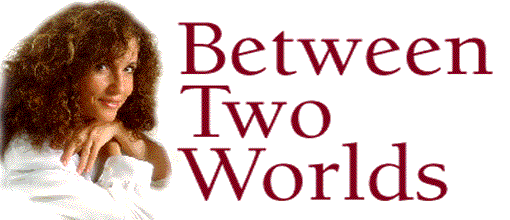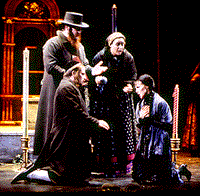

An acclaimed composer of contemporary symphonies, ShulamitRan wrote her first opera by drawing on ancient themes.
By Jennifer Vanasco
A few weeks before the worldpremiere of her first opera, composer Shulamit Ran is exhilarated--andexhausted.
"This is the most labor-intensive thing I'veever been involved in," says Ran, a Pulitzer Prize winner and theUniversity's William H. Colvin professor in music. "There's no endto it. Every aspect takes so much time--for instance, now I'm proofreadingthe score, which takes hours upon hours. I'm surprised my family hasn'tall divorced me en masse by now! They've been very patient."
Indeed, in the late-May preproduction frenzy, Ran'severy moment seems to be taken. While she breaks to discuss her work ina sunny conference room at the Lyric Opera Center for American Artists,passersby stick concerned heads through the doorway.
Danila Korogodsky, the production designer, whom Randescribes as "brilliant," pops in to tell her the costumes arenot being made in Chicago after all. An assistant entering the score intoa computer comes in to discuss deadlines. The props master consults Ranon whether shofroth, horns sacred to the Jewish tradition, can be usedonstage. The shofroth are actual ram's horns and are often unpredictable:When they are played, will they be in tune with the orchestra? Who willthey find to play the instruments? "After all," jokes Ran, "thereare no shofar musicians' unions."
They confer for a moment, but the problem won't besolved until a few days later, when Ran discovers that a man in her congregationplays the shofar. She decides to record him playing her score, and processthe recording so that the one shofar sounds like seven. The recording willbe played during the performance, with three big shofroth onstage usedonly as props. Finally, Ran turns back into the room with a smile and ashrug. "Sorry," she sighs. "It's been like this for months."
In late June, after the performances are over, sherecalls those last few weeks as an emotional maelstrom. "Every nightI would come home late. One day nothing would go right, and I would comehome depressed and worn out; the next day everything would fall into place,and I would come home excited and invigorated."
The toil was worth it. In its two June performancesat the Merle Reskin Theatre, Between Two Worlds (The Dybbuk) received ravereviews. The Chicago Sun-Times said it had "the vivid orchestral colorand highly charged vocal writing so typical of Ran," while the ChicagoTribune lauded its "faux-Hasidic lament" and "creepy Bartokianslithers," deeming the opera a "powerful new work."
Both performances, says Ran, were memorable, but fordifferent reasons. During the first, a storm had moved into the city, unbeknownstto the cast and audience members. "It was really funny," Ranremembers, "because a lot of the opera is concerned with the supernatural-andsuddenly, it seemed like this sound of bass drums was coming from outsidethe theater. I thought to myself, `I didn't write in bass drums there.'Soon we all realized it was the muffled sound of thunder, and it seemedto come in at just the right times." The second performance, she says,"was really the crescendo of all we had worked for. It came togetherin a magical way."
That final feeling of "coming together"echoed Ran's entire experience working with Lyric's cast and productionstaff, especially with British stage director Jonathan Eaton. "I hadnot anticipated this kind of closeness, this fantastic possibility,"she says. "I knew that this was a collaborative effort, and so I didn'twant to impose a specific visual conception. But when Jonathan worked withthe singers on the inner lives of their characters, when he interpretedmusical paragraphs to get at what was behind them-each time, he said exactlywhat I had in mind when I wrote the music, beautifully, faithfully."
Ran had dreamed for 15 years of writing an opera.An acclaimed composer of contemporary music, she had written symphoniesfor the Chicago Symphony Orchestra and pieces for other orchestras aroundthe world, as well as several vocal works.
At last, she felt she was ready to try an opera. Fiveyears ago, she began turning down other commissions so that she could cleara block of time to begin her task, even though she didn't yet have a commission.Luckily, Lyric Opera invited her to be its Brena and Lee Freeman, Sr.,composer-in-residence in 1994, allowing Ran to turn her complete attentionto the project.
"I was loony to think I could write an operawithout a commission," she says now. "But I really wanted todo one. And I wanted to write it on a topic that related to my own heritage,to who I am-an Israeli, a Jew. I saw S. Ansky's early 20th-century dramaThe Dybbuk performed when I was still a child, and it made a powerful impression.It was inspired by Eastern European and Jewish folklore, and there is somuch depth to it, so many things to think about-it's really a complex pieceof art."
Ran's opera tells the tragic tale of the beautifulLeya and the student Khonnon, who have loved each other since childhoodand who were promised to each other before birth. When Khonnon's fatherdies, however, Leya's father finds a wealthier match. Khonnon dies in afrenzy of despair at the news, and his spirit inhabits the grieving Leyaas a dybbuk, or wandering soul, who defiantly speaks through her beforethe wedding. A ritual exorcism exposes the broken marriage contract butalso violently casts out Khonnon's spirit, freeing Leya to marry her father'schosen bridegroom. Instead, she chooses death, and the love of Khonnon,"in the endless night of the endless world between worlds."
Turning a classic piece of folklore with four acts,nearly 40 roles, and a dead leading man into an opera presented a toughchallenge for librettist Charles Kondek and for Ran. But composing an opera,with human and instrumental voices, proved to be an extraordinary experienceas well. "To me, instruments and groups of instruments take on theirown characters, their own personae. It is as though each instrument hasa soul of its own," Ran says. "But I love the human voice-itis the most fantastic instrument. I love writing for it. It is always anexhilarating experience to have people other than myself express my musicthrough their artistry. There is nothing like it." 
Leya and Khonnon express their passion for each other in the synagogue.
Continuereading "Between Two Worlds"
Jennifer Vanasco is a staff writer in theUniversity News Office. This is her first article for the Magazine.
Go to:
- INVESTIGATIONS
- CHICAGO JOURNAL
- LETTERS
- CHICAGOPHILE
- Feature story: "Clean-uphitter"
- Feature story: "Wavingthe Chicago flag"
- Feature story: "Betweentwo Worlds"
- Feature story: "Bloomin review"
- CLASS NEWS, includingALUMNI AWARDS
- DEATHS
- BOOKS BY ALUMNI
- IN THE CLUBS
Return to August 1997 Tableof Contents